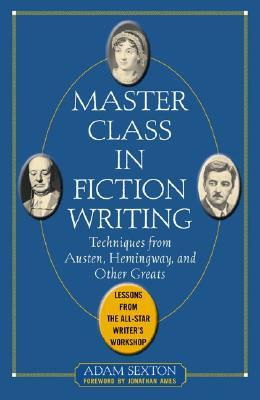I’m working on revisions to my novel (again). Several non-writer friends have asked me, “Isn’t it frustrating to do all those revisions?” No, really, I like it. I truly believe revisions, or self-editing if you prefer that term, are part of the creative process. To quote C.J. Cherryh (as I have elsewhere in this blog): “It is perfectly ok to write garbage – as long as you edit brilliantly.” I’m not claiming brilliance; I’m just saying the writing and the revisions are parts of a whole.
In my past life (as a lawyer), much of my writing was done as what most people would call editing. I’d take a draft from another lawyer and rework it. And, send that out for comment and then rework based on the comments. This part of the novel writing is much like that.
At  the same time, I’m reading Adam Sexton’s Master Class in Fiction Writing. Parts of that are brilliant and most of the rest of it is useful. Incidentally, many of the books that Sexton uses to illustrate his teachings are well-worth reading.
the same time, I’m reading Adam Sexton’s Master Class in Fiction Writing. Parts of that are brilliant and most of the rest of it is useful. Incidentally, many of the books that Sexton uses to illustrate his teachings are well-worth reading.
The comments that I got from my Beta-Readers did not conform to my suggested notations. See Beta-Readers and Publishing Options, published a few weeks ago. But my readers are the epitome of non-conformists, so what should I have expected? Instead, my readers made their own lists, and they did indeed see things that I hadn’t seen. All of it was very useful. One comment reinforced a concern that I had about a character, so I am working hard on that character’s development. Another comment spoke to language choices I’d made that were simply too modern for the time period that I’m writing about (I had gotten more careful about that later in the manuscript, but committed error in the early chapters.)
One comment that I’ll take to heart: “Pay attention to only about 10% of what people tell you about your work.” I don’t think the comment is correct, but I appreciate the spirit in which it was made. I am “paying attention” to all of what I’ve so generously been told. After due consideration, I may choose to go with my original writing or I may find adjustments that aren’t quite what the commentators may have been implying. Nonetheless, I think each of the comments is worth cherishing.
Thank you, Beta-Readers. You know who you are!

 What is the origin of the word “OK”?
What is the origin of the word “OK”?







 If there’s one major issue I find writers struggle with, it’s the difference between showing and telling. In every developmental report I write for a debut author, I find numerous instances where they would improve drastically by grasping this principle. This week I found myself explaining it again, and as I’ve been watching How To Get Away With Murder, I found myself reaching for courtroom terminology to explain …
If there’s one major issue I find writers struggle with, it’s the difference between showing and telling. In every developmental report I write for a debut author, I find numerous instances where they would improve drastically by grasping this principle. This week I found myself explaining it again, and as I’ve been watching How To Get Away With Murder, I found myself reaching for courtroom terminology to explain …